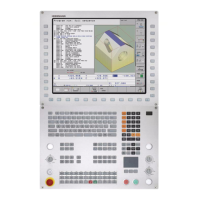July 2013 6.5 Tilting and swivel axes 749
Sphere radius In MP6601 you can enter the maximum permissible deviation of the
calibration-sphere radius. The sphere radius is measured and checked with
KinematicsOpt. This monitoring feature also detects incorrect probing caused
by contamination.
MP6600 KinematicsOpt: Amount of change
Input: 0.010 to 1.000 [mm]
Default: 0.05
MP6601 KinematicsOpt: Radius deviation of the calibration sphere
Input: 0.010 to 0.100 [mm]
Default: 0.02
PLC positioning Some rotary axes cannot be moved by the NC, e.g. Hirth axes that can be
positioned only by the PLC.
In MP 6602, you can also enter an M number that is used for positioning all
rotary axes. This M function will be executed instead of the positioning
movements through the NC. The rotary-axis angles required for this are saved
in the Q parameters Q120 to 122. As a result, a positioning movement must
always be initiated by an M macro. This is a very simple example of how this
M macro may look like:
BEGIN PGM MM
FN 19: PLC =+4 / Q120 ;the PLC positions the A axis
FN 19: PLC =+6 / Q122 ;the PLC positions the C axis
END PGM MM
Be sure to remember while programming that the rotary axes must be pre-
positioned to 0° degrees before the execution of the cycles if you use a PLC
positioning movement. Since, in this case, there is also a great danger of
collision if automatic presetting is used, this prerequisite must be confirmed
by the operator.
This macro is called from all KinematicsOpt cycles when rotary axes are
positioned. If an M function macro is specified, the target coordinates, not the
rotary-axis positioning movement, are saved in the Q parameters 120 to 122
(axis angles) and the M function is called. The M function must ensure the
correct positioning of the rotary axes to the nominal positions, as defined in
Q120 to Q122.
After optimization the position of the presets relative to the workpiece may
have changed. It is essential that you check or reset the datum points.
Only local Q parameters (QL) are allowed in the M macro and in the NC
programs called by the M macro. Otherwise, there is a great potential
danger of collision during the further execution of the cycle.
The cycles cannot verify that the correct position has been reached.

